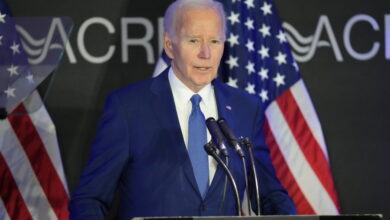What Rights Do Migrants Have?

This week, the Supreme Court cleared the way for Trump to deport planeloads of Venezuelan migrants. Trump called the ruling a victory, but it came with a catch: The administration’s rationale can still be challenged, and it must ensure that would-be deportees have their day in court. “All nine members of the court agree that judicial review is available,” Justice Brett Kavanaugh wrote in his concurrence.
Of all Trump’s actions so far, few have alarmed democracy scholars more than his mass deportations of migrants without a hearing. Why? Experts see a precedent that could undermine the liberties of all Americans.
Your right to due process — your day in court — underpins all of your other rights. If a prosecutor wants to deny you freedom and lock you up, she has to make her case. If a police officer illegally violates your privacy and searches your house to try to prove a crime, a trial can verify if he gathered the evidence legitimately. If Congress passes a law that lets officials arrest you for your political speech or religious beliefs, a court challenge can get the statute overturned.
It turns out that some of the Venezuelan migrants who were packed into planes and shipped to a prison in El Salvador may not be the gang members who officials say they are. That fact could have come out in hearings. In today’s newsletter, I’ll explain why our constitutional system depends on due process — and what might happen without it.
Trump and his allies argue that his deportations last month targeted criminal migrants — specifically, Venezuelans who were not citizens and were part of a gang, Tren de Aragua. But his administration never had to prove those claims in court. A judge never checked the government’s work.
And the government made mistakes. Officials rounded up migrants based on their clothes and tattoos, arguing they were proof of gang membership. A judge would bring skepticism to such claims. Several migrants say the government got it wrong with its crude approach.
One migrant says his tattoo is a crown that merely honors the soccer team Real Madrid. Another, Kilmar Armando Abrego Garcia, had protected legal status. The administration acknowledged it shouldn’t have deported him immediately, and a lower court ordered his return. The Supreme Court has put that order on hold for now.
These cases show the importance of due process. Governments mess up. Sometimes, officials act maliciously and abuse their power. The Constitution has an answer to those problems: A defendant’s day in court forces the state to prove that its actions are justifiable and lawful.
The administration has also made several other unprecedented immigration moves, such as revoking the visas of nearly 300 students without a clear explanation. So far, these cases are following some measure of due process; the students can challenge the decision before they’re deported. But if officials start to ship these students home without a hearing, that would clearly break with the Constitution.
A lack of due process presents a slippery slope: If government officials can say anything, true or not, to justify their actions — as they did with the Venezuelan migrants — what stops them from doing that to an American citizen? If they never have to prove someone is actually who they say he is, they can claim anything and act with impunity against anyone.
Trump’s deportations set a precedent that his opponents could abuse once they’re back in power. Republicans have benefited in recent elections from growing support among Latino voters, including Venezuelans. A Democratic president could cite Trump’s actions to deport so-called MAGAzuelans, claiming they’re also criminals with Tren de Aragua and in the country illegally, all without a court hearing.
Even some of Trump’s backers worry about the slipshod deportations. The podcaster Joe Rogan warned on his show, “You’ve got to get scared that people who are not criminals are getting, like, lassoed up and deported and sent to, like, El Salvador prisons.”
The legal arguments
The Trump administration argues that it has the power to ignore due process in these cases. It says the influx of unauthorized immigrants into the United States is an invasion, meaning these migrants are effectively alien enemies. Officials say that the president has special wartime powers, such as those outlined in the Alien Enemies Act of 1798, to detain and deport people without trial. They also say that noncitizens, especially those in the country illegally, don’t have the same rights as Americans.
Trump’s critics disagree. The constitutional amendments that enshrine due process rights apply to “persons,” not just citizens. Tellingly, current Supreme Court justices have voiced regret for Japanese internment during World War II, which detained people without due process.
And, generally, migrants have the right to challenge their removal in court, as my colleagues Albert Sun and Miriam Jordan explained:
The Supreme Court’s ruling this week suggests that the justices agree with Trump’s critics — that migrants, even people here illegally, have due process rights. That finding, however, is preliminary. The justices will likely issue a full decision after deportees challenge the law and appellate judges examine the issue. The court’s verdict could set the boundaries of everyone’s due process rights.
THE LATEST NEWS
Trump’s Tariffs
President Trump’s global tariffs took effect this morning. They hit nearly all U.S. allies and raised import taxes on Chinese goods to at least 104 percent. Stocks slumped in Asia and Europe in response. Investors are worried about a global recession. (Read the latest news here.)
China has retaliated with its own tariffs, set to take effect at midday, and the European Union is preparing a response. Many world leaders are trying to negotiate. Trump said 70 governments had approached the U.S., and many have scheduled phone calls and sent delegations to Washington. The administration is expected to begin talks with Japan and South Korea.
Still confused by the tariffs? These charts will answer all your questions.
More on Tariffs
Most clicked yesterday: Microplastics are in our brains. In a video, our reporter explains what that might mean for our health. Watch it here.
Lives Lived: King Holmes almost single-handedly legitimized the study of sexually transmitted infections, turning a neglected, stigmatized subject into a major field of medical research. He died at 87.
SPORTS
N.B.A.: The Denver Nuggets fired their coach, Mike Malone, two years after he won a title and with less than a week left in the season. They could still make the playoffs. It was part of a strange two weeks in the league.
M.L.B.: The former player who died in the roof collapse in the Dominican Republic was Octavio Dotel, 51, a reliever who played for 13 teams. Read about his life.
Are we living through a Yokossance? Over the past few years, Yoko Ono, 92, has been the focus of a tribute album, several biographies and a blockbuster exhibition. Now, another biography and a forthcoming documentary peer further into her well-chronicled life. Two Times pop music critics discuss what these histories add to our understanding of Ono.




